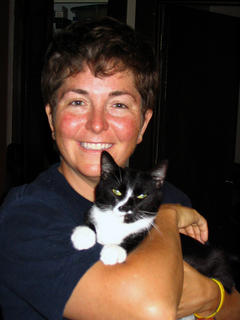The article "
Stopping the Clock--Without Asking" about Princeton's new policy that extends the tenure clock to parents automatically has raised quite a stir on an online discussion group that I frequent.
What is "stopping the tenure clock"? The idea here is that a university or college usually gives new professors only a certain amount of time (usually six or seven years) to get X number of articles published (sometimes in particular journals), a certain quality of student evaluations (however impossibly measured), and a certain amount of service to the department, college, university and profession. In some cases, the quantity required of these activities is known ahead of time, in other cases, it is unknown to the tenure-seeking professor. Worse yet, sometimes, the requirements change along the way.
"Stopping the tenure clock" entails giving the tenure-seeker extra time for some particular reason.
Maternity/Paternity, it has been argued, is a good reason to stop the tenure clock.
Why?
Academia, like the law profession is unique in how it can affect women's careers.
Let's do the math.
Jane goes to college (18)
Jane graduates college (21)
Jane takes a year off to travel/save money/decide what she wants to do with her life (22)
Jane can't get a job, so she goes to grad school (22).
Jane graduates with an M.A. in science/literature/economics and decides to go for her Ph.D (23)
Jane takes her classes and writes her dissertation in record time (5-6 years so she is now 29 years old)
Jane is lucky enough to land a tenure-track job that will provide tenure after 6 years.
Okay. So now, Jane is 29. She may or may not have gotten married along the way. She may or may not have had kids. If she had, she most likely would not have finished her dissertation. So let's assume that for this scenario, Jane is currently childless.
Now Jane has a choice: have kids pre-tenure (ages 29-35) or wait until she has tenure (> 35).
Hmmmmmmmm.
It doesn't take a Harvard Ph.D. to realize that such a vocation would have a differential effect on women.
As it turns out, the numbers reflect this story quite directly. Approximately 55% of students in 2- and 4- year colleges and universities are women. The same is true at the graduate level. "According to the NCES, in 1974, the 526,000 women students accounted for 44% of graduate enrollment. By 1994, that number had increased by 80% to 946,000 students" (Syverson, date unknown).
According to the
Committee on the Status of Women in the Economics Profession, the proportion of women declines as the rank goes up.
In 1972, for example, women earned 11.7 % of Bachelor's Degrees and 7.6% of Ph.D.s granted. That year, 8.8% of Assistant Professors, 3.7% of Associate Professors, 2.4% of Full Professors, and 4.5% of all tenured/tenure track professors were women (Blau, 2003).
Now, jump to 2003. Here we see that 34.1% of Bachelor's Degrees were awarded to women while 29.0% of Ph.D.s were granted to women.
Now, 26.5% of Assistant Professors, 20.1% of Associate Professors, 9.5% of Full Professors, and 15.% of all tenured/tenure track professors are women.
Sure we see an improvement (over the course of THIRTY YEARS!!!) but still, how do you explain the drop off?
There is a plethora of research that shows that women who have children lose ground professionally to: men without children, men with children, and women without children (see, for example, Crittenden, 2001). So, THEORETICALLY, stopping the clock is a direct benefit for parents (read: women) that attempts to bridge the gap between men and women when it comes to parenthood and career. It is part of the many "family-friendly" or "work/life" type of policies that help to make having a career and a family possible.
In theory, this benefit [clock stoppage upon request] lets new parents devote more time to their children without fear that it will hurt tenure reviews. In practice, many academics are afraid to stop the clock and feel that taking advantage of this benefit will stigmatize them and hurt their chances. Now along comes the Princeton Policy: Automatic clock stoppage for new parents.
This has spawned at least two negative reactions which I will describe via other's words:
NEGATIVE REACTION #1 This sort of thing, which happens far too often, is blatant discrimination against those who choose not to have children. Reproducing is a *choice*, not an unforeseeable accident which requires consideration by the employer. People who *choose* to put their careers on hold should take the consequences- - even if those consequences are diapers, formula, and first steps. What compensation will these universities offer those who have chosen *not* to breed?Paul WatsonCheers to Paul Watson. Both my wife and I are sick of excuses why people can't come to committee meetings etc. The refrain, "I have child care duties" is getting a bit much, of late. We (those that choose to be child free) end up doing their (folks with young children) work. We chose not to have children. Why should I pick up the time for others who choose to have kids and know what academic life is like (and don't start writing in as if you don't know what academic life entails *especially* as regards tenure). Extension of tenure should also come with higher standards, period. You want eight years, I want eight years of work that fits the standard of a college or university *at* eight years.Andrew Grossman
Academia is NOT family friendly, nor should it be. Let's stop pretending it is!TomNEGATIVE REACTION #2Princeton announces will stop the tenure clock for a year for new parents, male and female, without their requesting it. I'd bet the women will use their year to care for the baby and the men will use to pad their CVs, so beating out women faculty. A better solution: give members of two-earner couples a term off from teaching and the tenure clock with pay, provided each takes 6 months at home alone with the baby while the other works. Also provided they don't hire a nanny.Barbara BergmannMY OPINIONThe problem with Paul Watson's argument is that it is not
people who face the consequences of parenthood. It is
women. I am somewhat sympathetic to the child-as-consumption argument. Sure. It is a choice. And while children are, to some extent public goods, parents can just as easily eff up their kids as not. So while I would definitely benefit from someone's darling HONOR ROLL STUDENT ON BOARD who goes on to find a cure for cancer, I certainly pay for the hooligan who steals the quarters out of my accidentally-unlocked car parked on the street last night (yes, that really happened). But the data shows that it is FEMALE parents that pay more than MALE parents and that inequality deserves some attention.
The problem with Bergmann's argument (which is similar to how I feel about many of her arguments) is twofold. First, she is usually so defensive. Why wouldn't a woman be just as likely to pad her cv? Second, she is all about function over form. We can't have the state (or university) telling families how to raise kids. This change (getting dads more involved with direct parenting) has to come from the bottom up.
Lastly, I find it interesting that so many arguments come down to the idea of choice. If some consequence was due to someone's CHOICE rather than caused by some unforeseeable event, then we're supposed to feel differently about it? I've always been frustrated with this excruciatingly simple dichotomy with the gay nature/nurture debate. In my opinion, individual choice is a sacred right and good economic policy. No matter what choice we're talking about.
Saranna Thorton, who is doing research on what she calls the STC policy (stop tenure clock) says
Yes --
having children is choice.
But, so is smoking and getting a pulmonary disease or overeating and getting diabetes. Yet, I don't see complaints that university-provided group health insurance discriminates against people who try hard to stay healthy. Choosing to retire (rather than work until you die) is also a choice, but I don't see the same vehement complaints about phased retirement that I see about work/family policy.
REFERENCESBlau, Francine D. 2003. "Report of the Committee on the Status of women in the Economics Profession 2003".
Newsletter of the Committee on the Status of Women in the Economics Profession, Winter 2004.Crittenden, Ann. 2001.
The Price of Motherhood Henry Holt: New York.
Syverson, Peter D. "The New Majority." http://www.cgsnet.org/pdf/cctr706.pdf. Site last visited, 18 August, 2005.









